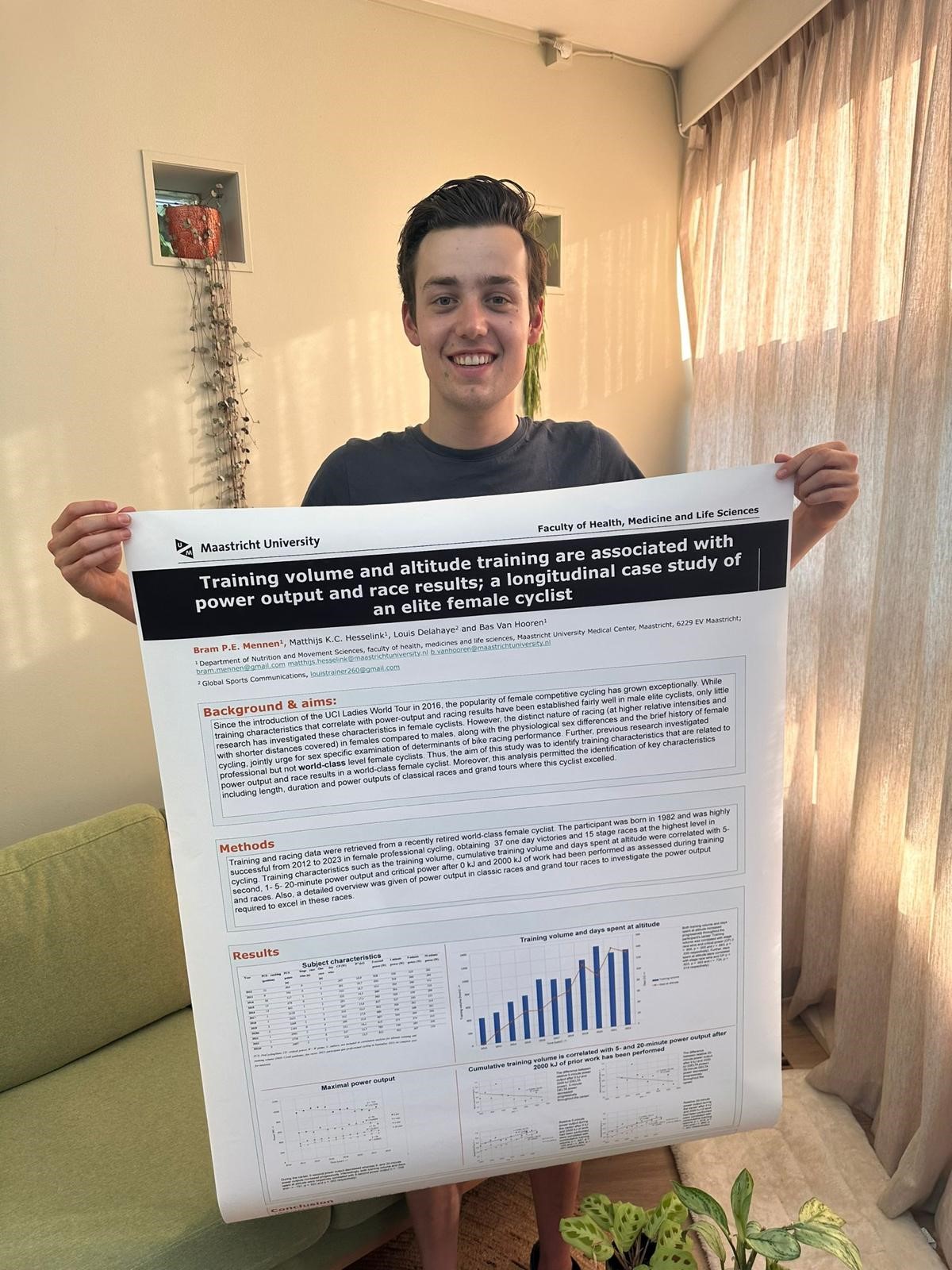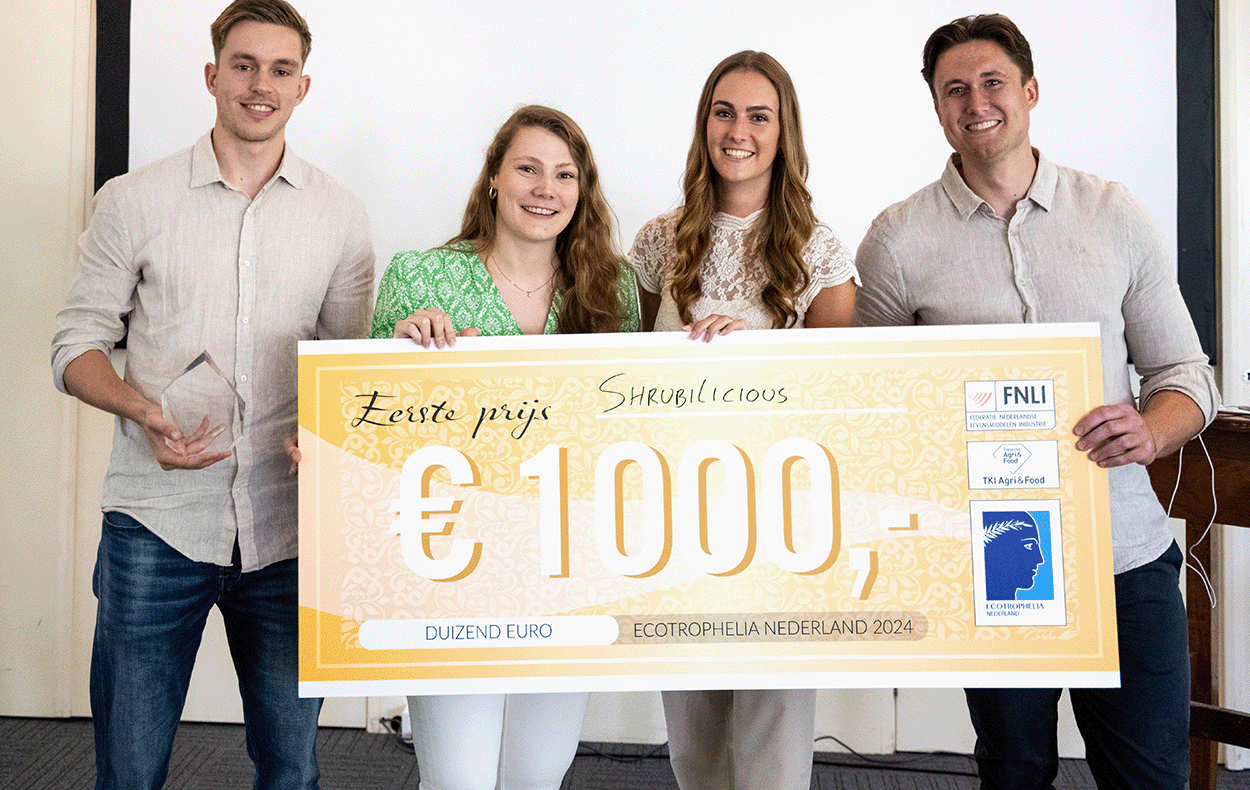This is not normal, but it is going well
Imagine 280 first-year bachelor’s students in Health Sciences, in week 5 of their 8-week block on Health, Nutrition and Exercise. All of a sudden, it is decided to move to online education. That means in the following week, among other things: holding 24 tutorials, 24 training groups, 48 ‘research teams’, with 24 tutors/trainers. And, a little later, a poster presentation that also has to be done online. Coordinator Rixt Zijlstra, who was also self-quarantined during the first two weeks of the block, looks back, along with student Isabelle Dekker, who is back home in Gorinchem. “You choose the place where you can best ride it out. And here with my parents, with my three sisters, it’s very cosy.”
Normally, Isabelle Dekker would now be sitting on a terrace in the sun in Maastricht and living in her student house in the city centre, together with three housemates. But after she left on Friday, 13 March with stuff for two weeks to go to her parents’ home in Gorinchem, she decided that same weekend with her father to make another round trip. This was going to take longer than two weeks.

Rixt Zijlstra in her home office
This article is part of 'We're Open', a series of stories about the UM community’s many activities during the coronavirus pandemic.
Changeover weekend with long days
In that same weekend, coordinator Rixt Zijlstra spent very long days in her apartment near the Maastricht railway station. The goal: to make sure that the 280 students from ‘her’ block could keep the regular class schedule. But, most of all, to cover all the course material they normally would. What tools did they have at their disposal? How could students and tutors be familiarised with them in the best possible way? How were they going to handle the poster presentation that was scheduled for a week and a half later?
None of the ‘normal’ course material was skipped over
Zijlstra: “Block planning group member Annemarie Koster and I were lucky that our colleague Nynke de Jong was able to show us how to do all of this. She’s very well-versed in online education.” Because the Zoom license was not yet finalised, they chose Blackboard Collaborate Ultra as their digital tool. After a couple of online test sessions with teachers and students, the tutorial groups started on Tuesday, 17 March, completely according to schedule. Tuesday morning’s lecture had already been sent to the students on Friday. Zijlstra: “Two years ago, we took part in a pilot project to record lectures so that students could look back at them, and most of the lectures have been recorded since last year. In terms of content, they haven’t skipped over anything that’s covered in the ‘normal’ curriculum.”
Minor technical difficulties and nice group members
Isabelle Dekker was not yet familiar with this version of Blackboard, but after a short explanation with her tutorial group, it went great. “We’re pretty technical”, she laughs. “Fortunately, my internet is good; two members of my group had problems with that—or the microphone didn't work so they had to type in their input, which is frustrating, of course.” Dekker is lucky with her group members, she realises. “There’s no longer an attendance requirement but, despite this, my group is doing very well.” She experienced the only ‘difficulty’ during the preliminary discussion, where you normally put everyone’s knowledge and ideas up on a whiteboard. “Twice, halfway through the session, someone accidentally deleted the online whiteboard, so all the notes were gone. In that case, I’d rather have a real whiteboard in a room.” (text continues below picture)

PBL also seems to work well without face-to-face contact
Zijlstra sees the disadvantage of Blackboard Collaborate Ultra as the fact that you can have a maximum of six people on the screen. In Zoom, that number is unlimited. “But that system only became available more than a week later, and by then we had already set up all of our education in Blackboard and everyone was familiar with that system. At that time, switching over for the last week and a half would have no longer been effective.”
Sometimes you do miss the non-verbal communication, Zijlstra finds. “You can’t see as easily whether everyone is paying attention, for example. But, all in all, I think it’s going better than expected and I hear that from the tutors as well. It’s remarkable to experience that face-to-face contact is not a prerequisite for our Problem-Based Learning system.”
Shy students come out of their shell
Dekker agrees. “The conversations are a little drier because you’re not seeing the other person’s body language. And sometimes I also get why people don’t feel like having a video connection.” For now, she thinks online education is a great solution, but “it wouldn’t be my preference to do it this way all the time. I would miss the personal face-to-face contact too much. I also think it’s impressive and interesting to see that the university, especially after the cyber attack in December, is now offering all of its education online.”
Another interesting side effect—students who are shy when it comes to actively participating in a tutorial group in person sometimes do better in an online setting. Zijlstra thinks that the threshold may be somewhat lower in a digital environment. Dekker adds, “The discussion chair can steer the interaction a little more because he or she gives the floor to someone who raises their hand and then, of course, you can choose to give the floor to someone who is normally a little more shy.”
‘Abnormal’ poster presentation
Also very different from ‘normal’ was the poster presentation of the 48 ‘research teams’, who in the preceding weeks carried out a small study into the effects of a nutritional or exercise intervention on a possible change in behaviour. Each team consisted of a maximum of six students. Where normally everyone was supposed to give a presentation, now one of the team members did so.
In each online meeting, there were six teams and two teachers. They could (after raising their hands) ask questions, give tips and more. “It took a little more time than normal, but there was also more interaction than normal”, Zijlstra says. “There were good questions and, overall, it went well in this form, although it was intensive for the four teachers to supervise and assess poster presentations non-stop from 9 to 5.”
Students need to feel like they’re not alone in this
Because students who have questions can normally see when coordinator Zijlstra is physically available, in this online setting she has also set up ‘consultation hours’ four times a week, where students can contact her via Blackboard. She also regularly sends a video message to everyone. “I also think it’s important to respond quickly to emails, to do everything you can to make students feel like ‘you're not alone in this’.”
Zijlstra also experienced this herself in another way. Because in her last face-to-face educational contacts, she saw quite a few coughing, possibly feverish students from Brabant, she decided to stay at home for two weeks from 13 March as a precaution. “I don't have a garden, so every now and then I opened the windows for some fresh air. Close friends did the shopping for me.” Luckily, she didn't get sick.
Making do with what we have
Dekker had to again get used to being at home, with her parents and three younger sisters again. “But we’re having a nice time. The weather has been pleasant so far and everyone in the Netherlands is in the same boat—that makes a difference.”
When she doesn't have to sit behind her laptop for the study programme, she tries to stay away from monitors as much as possible. “I put together jigsaw puzzles with the family, work in the yard or run. And we have a rowing machine at home.” Isabelle, like everyone else in these abnormal times, makes do with what she has.
Also read
-
Imagine this: as a newly graduated master's student, you get to share the insights you gained during your research at an international conference. This happened to Bram Mennen. At the end of June 2024, he presented the results of his thesis on the training data of top cyclist Annemiek van Vleuten at...
-
Moving on your own to a new country with a different culture and language and without a support network can be challenging. Master's student Beverlianne Green therefore quickly realised she wanted to get involved with the local community. Through the Personal & Professional Development Portal of...
-
Maastricht University students have won the Dutch final of the student competition Ecotrophelia, a drinking vinegar based on apple cider vinegar, fruit and herbs.

